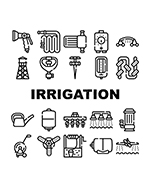Theme/Relevant Ministry:
WATER GOVERNANCE:
M/o Water Resources; M/o National Food Security & Research; Provincial Agricultural Departments
Project Brief:
Participatory Irrigation Management (PIM) reforms was introduced to mitigate the inept management of the traditional irrigation bureaucracy. It was hypothesized that these reforms would leave a positive impact on crop productivity and enhance the distributional equity of water among its users. The present study tried to compare the PIM and Non-PIM irrigation schemes under almost the same cropping systems of Sindh and Punjab provinces of Pakistan—link it to farm sizes, irrigation management practices, institutional arrangements, and governance structures. Both qualitative and quantitative research methods were used for studying different aspects of irrigation management and reform process. It was concluded that canal water distributional inequity offspring economic inequity along the spatial position of the canal and tail user significantly under perform its actual potential. Reform unable to generate hydro-solidarity between head and tail sections of the canal and thus farmers managed institutions—FOs and AWBs, unable to check the rent-seeking behavior of irrigation bureaucracy. Level of participation in WUAs activities don’t have a significant impact on the farm level productivity but the Institutional Performance of AWBs (IPAWB) have significant positive impact on the Composite Irrigation Management Performance (CIMP). Community cooperation and WUAs maturity have a significant positive impact on community participation in WUAs activities. Moreover, land asymmetry having significant negative relationship with land productivity, CIMP, IPAWB, and level of participation in WUAs activities. It has also been seen that irrigation bureaucracy only does an institutional mimicry under externally assisted push because there is substantial evidence that the PIM model was never adequately tested and implemented. Without active farmers’ agency—small and landless peasants, these paper organizations are unable to create multi-level accountability in irrigation management.
Public Policy Relevance:
This study helps to explore the multidimensional facets of water governance and their interconnectedness. It is helpful to enrich the more participatory, equitable and economical water legislation in the irrigation system, and as a result higher land and water productivity can be attained.
Status:
COMPLETED 100%
Final Research Report, Policy Brief and Journal article can be downloaded from the link: https://pide.org.pk/rasta/publications-cgp-1-0/

